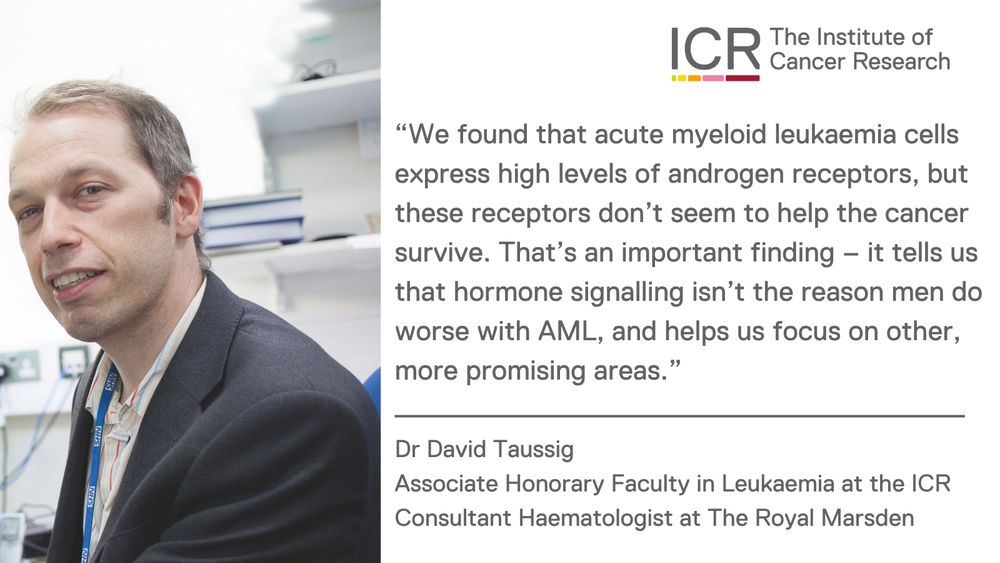
The Institute of Cancer Research
@icr.ac.uk
The ICR is making the discoveries that defeat cancer.
We're a top UK academic research centre, a postgrad college, and a charity.
📍 London (Chelsea and Sutton)
https://www.icr.ac.uk/
We're a top UK academic research centre, a postgrad college, and a charity.
📍 London (Chelsea and Sutton)
https://www.icr.ac.uk/
Ultimately, this work brings us closer to understanding why outcomes differ between men and women – and to developing more personalised, effective treatments for all patients with AML.
More from us here ⬇️
More from us here ⬇️

Why men fare worse in acute myeloid leukaemia: new study rules out hormone signalling
Why men fare worse in acute myeloid leukaemia: new study rules out hormone signalling
www.icr.ac.uk
November 11, 2025 at 10:24 AM
Ultimately, this work brings us closer to understanding why outcomes differ between men and women – and to developing more personalised, effective treatments for all patients with AML.
More from us here ⬇️
More from us here ⬇️
By ruling out a previously plausible explanation, the research helps focus efforts on more promising areas – from drug metabolism to immune responses – and highlights the importance of considering sex as a biological variable in future AML research and clinical trial design.

November 11, 2025 at 10:24 AM
By ruling out a previously plausible explanation, the research helps focus efforts on more promising areas – from drug metabolism to immune responses – and highlights the importance of considering sex as a biological variable in future AML research and clinical trial design.
The study found that while AML cells express high levels of androgen receptors, these receptors don’t appear to influence how the cancer grows or responds to treatment. Instead, inflammation and immune signalling may play a bigger role.
November 11, 2025 at 10:24 AM
The study found that while AML cells express high levels of androgen receptors, these receptors don’t appear to influence how the cancer grows or responds to treatment. Instead, inflammation and immune signalling may play a bigger role.
In addition to preventing the need for amputations, this new treatment combination could help stop cancer spreading and even prime treatment-resistant tumours to respond to immunotherapy.
Read more ⬇️
Read more ⬇️

New combination treatment could overcome immunotherapy resistance in difficult-to-treat cancers
New combination treatment could overcome immunotherapy resistance in difficult-to-treat cancers
www.icr.ac.uk
November 7, 2025 at 9:56 AM
In addition to preventing the need for amputations, this new treatment combination could help stop cancer spreading and even prime treatment-resistant tumours to respond to immunotherapy.
Read more ⬇️
Read more ⬇️
Our researchers showed that delivering a cancer-fighting virus alongside isolated limb perfusion triggered a whole-body immune response rather than just a localised one in the affected limb. They also found this approach to be well-tolerated and, for some patients, very effective.
November 7, 2025 at 9:56 AM
Our researchers showed that delivering a cancer-fighting virus alongside isolated limb perfusion triggered a whole-body immune response rather than just a localised one in the affected limb. They also found this approach to be well-tolerated and, for some patients, very effective.
Dr Amin Mirza shares how these complementary technologies help our scientists to characterise new compounds, understand how they interact with biological targets and identify those with the potential to become treatments.

From molecules to medicines: the role of mass spectrometry and nuclear magnetic resonance
From molecules to medicines: the role of mass spectrometry and nuclear magnetic resonance
www.icr.ac.uk
November 6, 2025 at 9:37 AM
Dr Amin Mirza shares how these complementary technologies help our scientists to characterise new compounds, understand how they interact with biological targets and identify those with the potential to become treatments.
From weighing molecules with extraordinary precision to visualising their atomic structures, our scientists are harnessing cutting-edge chemical analysis tools to accelerate drug discovery from lab bench to bedside.
November 6, 2025 at 9:37 AM
From weighing molecules with extraordinary precision to visualising their atomic structures, our scientists are harnessing cutting-edge chemical analysis tools to accelerate drug discovery from lab bench to bedside.
Read more about Sir Bob Champion's incredible work here ⬇️

Legendary jockey Bob Champion awarded honorary doctorate at ICR graduation ceremony
Legendary jockey Bob Champion awarded honorary doctorate at ICR graduation ceremony
www.icr.ac.uk
October 27, 2025 at 7:30 PM
Read more about Sir Bob Champion's incredible work here ⬇️
@helink.bsky.social, Chief Executive of the ICR said,
“We warmly congratulate Bob on this well-deserved honour and thank him for his generous support over the years - both in raising vital funds and championing the importance of our life-changing work.”
“We warmly congratulate Bob on this well-deserved honour and thank him for his generous support over the years - both in raising vital funds and championing the importance of our life-changing work.”
October 27, 2025 at 7:30 PM
@helink.bsky.social, Chief Executive of the ICR said,
“We warmly congratulate Bob on this well-deserved honour and thank him for his generous support over the years - both in raising vital funds and championing the importance of our life-changing work.”
“We warmly congratulate Bob on this well-deserved honour and thank him for his generous support over the years - both in raising vital funds and championing the importance of our life-changing work.”
Soft tissue sarcomas have historically been very difficult to treat. However, this new research suggests that by exploiting the cancer’s own resistance evolutions, we may be able to steer it towards drug-sensitive states, making treatment more effective.
www.icr.ac.uk
October 23, 2025 at 9:34 AM
Soft tissue sarcomas have historically been very difficult to treat. However, this new research suggests that by exploiting the cancer’s own resistance evolutions, we may be able to steer it towards drug-sensitive states, making treatment more effective.
Read more from the ICR ⬇️

Global study challenges ‘cancer epidemic’ in young adults – except for bowel cancer
Global study challenges ‘cancer epidemic’ in young adults – except for bowel cancer
www.icr.ac.uk
October 21, 2025 at 8:05 AM
Read more from the ICR ⬇️
Only bowel cancer is rising faster in younger adults. Screening may be helping older adults avoid it.
More in @annalsofim.bsky.social
More in @annalsofim.bsky.social

Trends in Cancer Incidence in Younger and Older Adults: An International Comparative Analysis: Annals of Internal Medicine: Vol 0, No 0
Background: There is concern about widespread increases in cancer incidence rates in younger adults. Objective: To compare international cancer incidence trends in younger adults (aged 20 to 49 years)...
www.acpjournals.org
October 21, 2025 at 8:05 AM
Only bowel cancer is rising faster in younger adults. Screening may be helping older adults avoid it.
More in @annalsofim.bsky.social
More in @annalsofim.bsky.social
Read how Emily’s work is advancing adaptive trials and patient-reported outcomes in early-phase cancer studies ⤵️

From data to discovery: the impact of statistics in cancer research
From data to discovery: the impact of statistics in cancer research
www.icr.ac.uk
October 20, 2025 at 9:21 AM
Read how Emily’s work is advancing adaptive trials and patient-reported outcomes in early-phase cancer studies ⤵️
At the ICR, statisticians such as PhD student Emily Alger, @mle-alger.bsky.social are building on those methods to design smarter, more patient-centred clinical trials – ensuring that data leads to better decisions and better outcomes for patients.

October 20, 2025 at 9:21 AM
At the ICR, statisticians such as PhD student Emily Alger, @mle-alger.bsky.social are building on those methods to design smarter, more patient-centred clinical trials – ensuring that data leads to better decisions and better outcomes for patients.
The COVID-19 pandemic showed how adaptive statistical designs accelerate the discovery of life-saving treatments. These principles commonly used in cancer research, continue to shape how we test new therapies today.
October 20, 2025 at 9:21 AM
The COVID-19 pandemic showed how adaptive statistical designs accelerate the discovery of life-saving treatments. These principles commonly used in cancer research, continue to shape how we test new therapies today.

